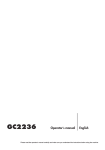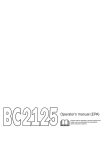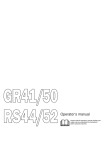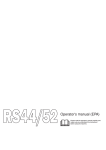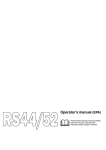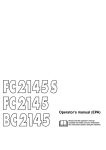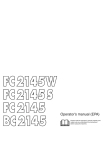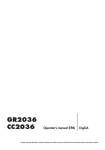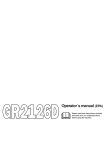Download Jonsered BC2043 Brush Cutter User Manual
Transcript
Operator′s manual Please read the operator’s manual carefully and make sure you understand the instructions before using the machine. KEY TO SYMBOLS Symbols Only use non-metallic, flexible cutting attachments, i.e. trimmer heads with trimmer cord. WARNING! A clearing saw, brushcutter or trimmer can be dangerous if used incorrectly or carelessly, and can cause serious or fatal injury to the operator or others. It is extremely important that you read and understand the contents of this operator’s manual. Noise emission to the environment according to the European Community’s Directive. The machine’s emission is specified in chapter Technical data and on label. Please read the operator’s manual carefully and make sure you understand the instructions before using the machine. Other symbols/decals on the machine refer to special certification requirements for certain markets. Always wear: • A protective helmet where there is a risk of falling objects • Approved hearing protection • Approved eye protection Switch off the engine by moving the stop switch to the STOP position before carrying out any checks or maintenance. Always wear approved protective gloves. Max. speed of output shaft, rpm This product is in accordance with applicable EC directives. Regular cleaning is required. Watch out for thrown objects and ricochets. Visual check. The operator of the machine must ensure, while working, that no persons or animals come closer than 15 metres. Machines fitted with saw blades or grass blades can be thrown violently to the side when the blade comes into contact with a fixed object. This is called blade thrust. The blade is capable of amputating an arm or leg. Always keep people and animals at least 15 metres from the machine. Arrows which show limits for handle positioning. Always wear approved protective gloves. Wear sturdy, non-slip boots. 2 – English 15 m 50FT 15 m 50FT Approved eye protection must always be used. CONTENTS Contents KEY TO SYMBOLS Symbols ....................................................................... CONTENTS Contents ...................................................................... Note the following before starting: ................................ INTRODUCTION Dear Customer, ............................................................ WHAT IS WHAT? What is what? .............................................................. GENERAL SAFETY PRECAUTIONS Impor tant ...................................................................... Personal protective equipment ..................................... Machine′s safety equipment ........................................ Cutting equipment ........................................................ ASSEMBLY Fitting the main body ................................................... Fitting the handlebar .................................................... Connecting throttle cable and stop switch wires .......... Assembling the cutting equipment ............................... Adjusting the harness and clearing saw ...................... Standard harness ........................................................ FUEL HANDLING Fuel safety ................................................................... Fuel .............................................................................. Fuelling ........................................................................ STARTING AND STOPPING Check before starting ................................................... Starting and stopping ................................................... WORKING TECHNIQUES General working instructions ....................................... MAINTENANCE Carburettor ................................................................... Muffler .......................................................................... Cooling system ............................................................ Air filter ......................................................................... Bevel gear .................................................................... Spark plug .................................................................... Maintenance schedule ................................................. TECHNICAL DATA Technical data .............................................................. EC-declaration of conformity ........................................ Note the following before starting: Please read the operator’s manual carefully. 2 3 3 ! 4 5 ! 6 6 7 9 11 11 11 12 13 13 ! WARNING! Long-term exposure to noise can result in permanent hearing impairment. So always use approved hearing protection. WARNING! Under no circumstances may the design of the machine be modified without the permission of the manufacturer. Always use genuine accessories. Non-authorized modifications and/or accessories can result in serious personal injury or the death of the operator or others. WARNING! A clearing saw, brushcutter or trimmer can be dangerous if used incorrectly or carelessly, and can cause serious or fatal injury to the operator or others. It is extremely important that you read and understand the contents of this operator’s manual. 14 14 15 16 16 18 21 21 21 21 22 22 23 24 25 English –3 INTRODUCTION Dear Customer, Congratulations on your choice to buy a Jonsered product! We are convinced that you will appreciate with great satisfaction the quality and performance of our product for a very long time to come. The purchase of one of our products gives you access to professional help with repairs and service whenever this may be necessary. If the retailer who sells your machine is not one of our authorised dealers, ask for the address of your nearest service workshop. It is our wish that you will be satisfied with your product and that it will be your companion for a long time. Think of this operator′s manual as a valuable document. By following its′ content (using, service, maintenance etc) the life span and the second-hand value of the machine can be extended. If you will sell this machine, make sure that the buyer will get the operator′s manual. Good luck on using your Jonsered machine! Jonsered has a policy of continuous product development and therefore reserves the right to modify the design and appearance of products without prior notice. 4 – English WHAT IS WHAT? 1 2 3 7 10 9 11 12 8 4 5 16 14 15 6 32 20 13 17 25 21 18 26 30 19 27 22 28 31 23 29 24 5 4 What is what? 1 Trimmer head 17 Air purge 2 Bevel gear 18 Air filter cover 3 Grease filler cap, bevel gear 19 Fuel tank 4 Cord cutter 20 Starter handle 5 Cutting attachment guard 21 Transport guard 6 Guard extension 22 Socket spanner 7 Shaft 23 Spanner 8 Handle adjustment 24 Locking pin 9 Throttle control 25 Locking nut 10 Stop switch 26 Support flange 11 Start throttle button 27 Support cup 12 Throttle lockout 28 Blade 13 Suspension ring 29 Drive disc 14 Clutch cover 30 Harness 15 Choke control 31 Operator′s manual 16 Cylinder cover 32 Handlebar English –5 GENERAL SAFETY PRECAUTIONS Important IMPORTANT! The machine is only designed for trimming grass. The only accessories you can operate with this engine unit are the cutting attachments we recommend in the chapter on Technical data. ! WARNING! Listen out for warning signals or shouts when you are wearing hearing protection. Always remove your hearing protection as soon as the engine stops. HELMET A protective helmet where there is a risk of falling objects Never use the machine if you are tired, if you have drunk alcohol, or if you are taking medication that could affect your vision, your judgement or your co-ordination. Wear personal protective equipment. See instructions under the heading ”Personal protective equipment”. Never use a machine that has been modified in any way from its original specification. Never use a machine that is faulty. Carry out the checks, maintenance and service instructions described in this manual. Some maintenance and service measures must be carried out by trained and qualified specialists. See instructions under the heading Maintenance. All covers, guards and handles must be fitted before starting. Ensure that the spark plug cap and ignition lead are undamaged to avoid the risk of electric shock. HEARING PROTECTION Wear hearing protection that provides adequate noise reduction. EYE PROTECTION Always wear approved eye protection. If you use a visor then you must also wear approved protective goggles. Approved protective goggles must comply with standard ANSI Z87.1 in the USA or EN 166 in EU countries. The machine operator must ensure that no people or animals come closer than 15 metres while working. When several operators are working in the same area the safety distance should be at least twice the tree height and no less than 15 metres. GLOVES ! WARNING! This machine produces an electromagnetic field during operation. This field may under some circumstances interfere with active or passive medical implants. To reduce the risk of serious or fatal injury, we recommend persons with medical implants to consult their physician and the medical implant manufacturer before operating this machine. Gloves should be worn when necessary, e.g., when fitting cutting attachments. BOOTS Wear boots with steel toe-caps and non-slip sole. ! WARNING! Running an engine in a confined or badly ventilated area can result in death due to asphyxiation or carbon monoxide poisoning. Personal protective equipment IMPORTANT! A clearing saw, brushcutter or trimmer can be dangerous if used incorrectly or carelessly, and can cause serious or fatal injury to the operator or others. It is extremely important that you read and understand the contents of this operator’s manual. You must use approved personal protective equipment whenever you use the machine. Personal protective equipment cannot eliminate the risk of injury but it will reduce the degree of injury if an accident does happen. Ask your dealer for help in choosing the right equipment. 6 – English CLOTHING Wear clothes made of a strong fabric and avoid loose clothing that can catch on twigs and branches. Always wear heavy, long pants. Do not wear jewellery, shorts sandals or go barefoot. Secure hair so it is above shoulder level. FIRST AID KIT Always have a first aid kit nearby. GENERAL SAFETY PRECAUTIONS Machine′s safety equipment Press the throttle lockout and make sure it returns to its original position when you release it. This section describes the machine′s safety equipment, its purpose, and how checks and maintenance should be carried out to ensure that it operates correctly. See the ”What is what?” section to locate where this equipment is positioned on your machine. The life span of the machine can be reduced and the risk of accidents can increase if machine maintenance is not carried out correctly and if service and/or repairs are not carried out professionally. If you need further information please contact your nearest service workshop. IMPORTANT! All servicing and repair work on the machine requires special training. This is especially true of the machine′s safety equipment. If your machine fails any of the checks described below you must contact your service agent. When you buy any of our products we guarantee the availability of professional repairs and service. If the retailer who sells your machine is not a servicing dealer, ask him for the address of your nearest service agent. ! WARNING! Never use a machine with faulty safety equipment. The machine’s safety equipment must be checked and maintained as described in this section. If your machine fails any of these checks contact your service agent to get it repaired. Check that the throttle control and throttle lockout move freely and that the return springs work properly. See instructions under the heading Start. Start the machine and apply full throttle. Release the throttle and check that the cutting attachment stops and remains at a standstill. If the cutting attachment rotates with the throttle in the idle position then the carburettor idle setting must be checked. See instructions under the heading Maintenance. Throttle lockout The throttle lockout is designed to prevent accidental operation of the throttle control. When you press the lock (A) (i.e. when you grasp the handle) it releases the throttle control (B). When you release the handle the throttle control and the throttle lockout both move back to their original positions. This movement is controlled by two independent return springs. This arrangement means that the throttle control is automatically locked at the idle setting. Stop switch Use the stop switch to switch off the engine. A B Make sure the throttle control is locked at the idle setting when the throttle lockout is released. Start the engine and make sure the engine stops when you move the stop switch to the stop setting. Cutting attachment guard This guard is intended to prevent loose objects from being thrown towards the operator. The guard also protects the operator from accidental contact with the cutting attachment. Check that the guard is undamaged and not cracked. Replace the guard if it has been exposed to impact or is cracked. English –7 GENERAL SAFETY PRECAUTIONS Always use the recommended guard for the cutting attachment you are using. See chapter on Technical data. ! WARNING! Never use a cutting attachment without an approved guard. See the chapter on Technical data. If an incorrect or faulty guard is fitted this can cause serious personal injury. Quick release There is an easily accessible, quick release fitted at the front as a safety precaution in case the engine catches fire, or in any other situation that requires you to free yourself from the machine and harness. See instructions under the heading Adjusting the harness and clearing saw. Vibration damping system Your machine is equipped with a vibration damping system that is designed to minimize vibration and make operation easier. Check that the harness straps are correctly positioned. Once the harness and machine have been adjusted, check that the harness quick release works correctly. Muffler Using incorrectly wound cord or a blunt or incorrect cutting attachment (wrong type or incorrectly filed, see instructions under the heading Filing the blade) increases the level of vibration. The muffler is designed to keep noise levels to a minimum and to direct exhaust fumes away from the user. A muffler fitted with a catalytic converter is also designed to reduce harmful exhaust gases. The machine′s vibration damping system reduces the transfer of vibration between the engine unit/cutting equipment and the machine′s handle unit. Regularly check the vibration damping units for cracks or deformation. Check that the vibration damping element is undamaged and securely attached. ! WARNING! Overexposure to vibration can lead to circulatory damage or nerve damage in people who have impaired circulation. Contact your doctor if you experience symptoms of overexposure to vibration. Such symptoms include numbness, loss of feeling, tingling, pricking, pain, loss of strength, changes in skin colour or condition. These symptoms normally appear in the fingers, hands or wrists. The risk increases at low temperatures. In countries that have a warm and dry climate there is a significant risk of fire. We therefore fit certain mufflers with a spark arrestor mesh. Check whether the muffler on your machine is fitted with this kind of mesh. For mufflers it is very important that you follow the instructions on checking, maintaining and servicing your machine. Never use a machine that has a faulty muffler. 8 – English GENERAL SAFETY PRECAUTIONS Regularly check that the muffler is securely attached to the machine. Cutting equipment This section describes how to choose and maintain your cutting equipment in order to: If the muffler on your machine is fitted with a spark arrestor mesh this must be cleaned regularly. A blocked mesh will cause the engine to overheat and may lead to serious damage. ! ! ! WARNING! Mufflers fitted with catalytic converters get very hot during use and remain so for some time after stopping. This also applies at idle speed. Contact can result in burns to the skin. Remember the risk of fire! WARNING! The inside of the muffler contain chemicals that may be carcinogenic. Avoid contact with these elements in the event of a damaged muffler. WARNING! Bear in mind that: The exhaust fumes from the engine are hot and may contain sparks which can start a fire. Never start the machine indoors or near combustible material! • Reduce the risk of blade thrust. • Obtain maximum cutting performance. • Extend the life of cutting equipment. IMPORTANT! Only use cutting attachments with the guards we recommend! See the chapter on Technical data. Refer to the instructions for the cutting attachment to check the correct way to load the cord and the correct cord diameter. Keep the teeth of the blade correctly sharpened! Follow our recommendations. Also refer to the instructions on the blade packaging. ! ! WARNING! Always stop the engine before doing any work on the cutting attachment. This continues to rotate even after the throttle has been released. Ensure that the cutting attachment has stopped completely and disconnect the HT lead from the spark plug before you start to work on it. WARNING! Using an incorrect cutting attachment or an incorrectly sharpened blade increases the risk of blade thrust. Locking nut Cutting equipment A locking nut is used to secure some types of cutting attachment. Grass blades and grass cutters are intended for cutting coarse grass. A trimmer head is intended for trimming grass. When fitting, tighten the nut in the opposite direction to the direction of rotation of the cutting attachment. To remove it, undo the nut in the same direction as the cutting attachment rotates. (CAUTION! The nut has a left-hand thread.) Tighten the nut using the socket spanner. General rules Only use cutting attachments with the guards we recommend! See the chapter on Technical data. The nylon lining inside the locking nut must not be so worn that you can turn it by hand. The lining should offer a resistance of at least 1.5 Nm. The nut should be replaced after it has been put on approx. 10 times. English –9 GENERAL SAFETY PRECAUTIONS Keep the teeth of the blade correctly sharpened! Follow our instructions and use the recommended file gauge. An incorrectly sharpened or damaged blade increases the risk of accidents. Trimmer head IMPORTANT! Always ensure the trimmer cord is wound tightly and evenly around the drum, otherwise the machine will generate harmful vibration. • Only use the recommended trimmer heads and trimmer cords. These have been tested by the manufacturer to suit a particular engine size. This is especially important when a fully automatic trimmer head is used. Only use the recommended cutting attachment. See the chapter on Technical data. • Smaller machines generally require small trimmer heads and vice versa. This is because when clearing using a cord the engine must throw out the cord radially from the trimmer head and overcome the resistance of the grass being cleared. • The length of the cord is also important. A longer cord requires greater engine power than a shorter cord of the same diameter. • Make sure that the cutter on the trimmer guard is intact. This is used to cut the cord to the correct length. • To increase the life of the cord it can be soaked in water for a couple of days. This will make the line tougher so that it lasts longer. Check the cutting attachment for damage or cracks. A damaged cutting attachment should always be replaced. Sharpening grass cutters and grass blades • See the cutting attachment packaging for correct sharpening instructions. Sharpen blades and cutters using a single-cut flat file. • Sharpen all edges equally to maintain the balance of the blade. ! WARNING! Always discard a blade that is bent, twisted, cracked, broken or damaged in any other way. Never attempt to straighten a twisted blade so that it can be reused. Only use original blades of the specified type. 10 – English ASSEMBLY Fitting the main body Connect the engine (A) to the tube (B) with four screws (C). A Connecting throttle cable and stop switch wires 1 Remove the air filter cover. 2 Insert the throttle cable (A) through the carburettor bracket (B), then screw the cable adjuster sleeve (C) into the carburettor bracket fully. 3 Position the slotted fitting (D) on the carburettor so the recessed hole (E) for the cable lug (F) is away from the cable adjuster sleeve. 4 Rotate the carburettor throttle cam and slip the throttle cable through the slot in the slotted fitting, making sure the cable lug drops into the recessed hole. 5 Operate the throttle trigger a few times to make sure that it works correctly. 6 Adjust the cable adjuster sleeve so the stop on the carburettor throttle cam just contacts the throttle stop and the cable position keep 1-2 mm play between the cable lug and the slotted fitting when the throttle trigger is fully depressed. C B Fitting the handlebar • • Fit the handlebar in the handlebar clamp on the shaft using six screws. Attach the cabling to the shaft with two cabling holders. 1-2mm • Put on the harness and hang the machine from the support hook. Now make a final adjustment so that the machine is in a comfortable working position when it hangs from the harness. 7 When the throttle cable is adjusted correctly, tighten the locking nut (G). 8 Plug the stop switch wires (H) into the matching connectors from the engine. Note that wire polarity is not important. H English – 11 ASSEMBLY 9 Lap and fix the stop switch wires and connectors with clamp (I). Fitting a blade guard, grass blade and grass cutter I • Fit the guard (A) to the gear housing using the support plate (M) and two screws (L). B L C M 10 Refit the air filter cover. A Assembling the cutting equipment ! WARNING! When fitting the cutting attachment it is extremely important that the raised section on the drive disc/support flange engages correctly in the centre hole of the cutting attachment. If the cutting attachment is fitted incorrectly it can result in serious and/or fatal personal injury. • Fit the drive disc (B) on the output shaft. • Turn the blade shaft until one of the holes in the drive disc aligns with the corresponding hole in the gear housing. • Insert the locking pin (C) in the hole to lock the shaft. • Place the blade (D), support cup (E) and support flange (F) on the output shaft. G E WARNING! Never use a cutting attachment without an approved guard. See the chapter on Technical data. If an incorrect or faulty guard is fitted this can cause serious personal injury. F IMPORTANT! If a saw blade or grass blade are to be used the machine must be equipped with the correct handlebar, blade guard and harness. B ! D C Fitting the cord cutter and guard extension to the trimmer guard • Attach the cord cutter to the guard extension with screw and washer as shown. • Fit the guard extension to the trimmer guard as shown. 12 – English • Fit the nut (G). The nut must be tightened to a torque of 35-50 Nm (3.5-5 kpm). Use the socket spanner in the tool kit. Hold the shaft of the spanner as close to the blade guard as possible. To tighten the nut, turn the spanner in the opposite direction to the direction of rotation (Caution! left-hand thread). ASSEMBLY Fitting other guards and cutting attachments Standard harness Quick release • Fit the guard (A) to the gear housing using the support plate (M) and two screws (L). B At the front is an easily accessible, quick release. Use this if the engine catches fire or in any other emergency situation that requires you to free yourself from the machine and harness. L C M A • Fit the drive disc (B) on the output shaft. • Turn the blade shaft until one of the holes in the drive disc aligns with the corresponding hole in the gear housing. • Insert the locking pin (C) in the hole to lock the shaft. • Screw on the trimmer head (H) in the opposite direction to the direction of rotation. • To dismantle, follow the instructions in the reverse order. Adjusting the harness and clearing saw ! WARNING! When using a clearing saw it must always be hooked securely to the harness. Otherwise you will be unable to control the clearing saw safely and this can result in injury to yourself or others. Never use a harness with a defective quick release. Spreading the load on your shoulders A well-adjusted harness and machine makes work much easier. Adjust the harness for the best working position. Tension the side straps so that the weight is evenly distributed across both shoulders. Correct height Adjust the shoulder strap so that the cutting attachment is parallel to the ground. Correct balance Let the cutting attachment rest lightly on the ground. Adjust the position of the suspension ring to balance the clearing saw correctly. English – 13 FUEL HANDLING Fuel safety Petrol Never start the machine: 1 If you have spilt fuel on it. Wipe off the spillage and allow remaining fuel to evaporate. 2 If you have spilt fuel on yourself or your clothes, change your clothes. Wash any part of your body that has come in contact with fuel. Use soap and water. 3 If the machine is leaking fuel. Check regularly for leaks from the fuel cap and fuel lines. NB! Always use a quality petrol/oil mixture at least 90 octane (RON). If your machine is equipped with a catalytic converter (see chapter on Technical data) always use a good quality unleaded petrol/oil mixture. Leaded petrol will destroy the catalytic converter. Use low-emission petrol, also known as alkylate petrol, if it is available. Transport and storage • Store and transport the machine and fuel so that there is no risk of any leakage or fumes coming into contact with sparks or naked flames, for example, from electrical machinery, electric motors, electrical relays/switches or boilers. • When storing and transporting fuel always use approved containers intended for this purpose. • When storing the machine for long periods the fuel tank must be emptied. Contact your local petrol station to find out where to dispose of excess fuel. • Ensure the machine is cleaned and that a complete service is carried out before long-term storage. • The lowest octane recommended is 90 (RON). If you run the engine on a lower octane grade than 90 so-called knocking can occur. This gives rise to a high engine temperature, which can result in serious engine damage. • When working at continuous high revs a higher octane rating is recommended. Two-stroke oil • The transport guard must always be fitted to the cutting attachment when the machine is being transported or in storage. • For best results and performance use JONSERED twostroke engine oil, which is specially formulated for our aircooled two-stroke engines. • Secure the machine during transport. • Never use two-stroke oil intended for water-cooled engines, sometimes referred to as outboard oil (rated TCW). • Never use oil intended for four-stroke engines. • A poor oil quality and/or too high oil/fuel ratio may jeopardise function and decrease the life time of catalytic converters. • Mixing ratio ! WARNING! Take care when handling fuel. Bear in mind the risk of fire, explosion and inhaling fumes. Fuel NB! The machine is equipped with a two-stroke engine and must always been run using a mixture of petrol and two-stroke oil. It is important to accurately measure the amount of oil to be mixed to ensure that the correct mixture is obtained. When mixing small amounts of fuel, even small inaccuracies can drastically affect the ratio of the mixture. 1:50 (2%) with JONSERED two-stroke oil. 1:33 (3%) with oils class JASO FB or ISO EGB formulated for air-cooled, two-stroke engines. Petrol, litre ! WARNING! Fuel and fuel fumes are highly inflammable and can cause serious injury when inhaled or allowed to come in contact with the skin. For this reason observe caution when handling fuel and make sure there is adequate ventilation. 14 – English Two-stroke oil, litre 2% (1:50) 3% (1:33) 5 0,10 0,15 10 0,20 0,30 15 0,30 0,45 20 0,40 0,60 FUEL HANDLING Fuelling Mixing • Always mix the petrol and oil in a clean container intended for fuel. • Always start by filling half the amount of the petrol to be used. Then add the entire amount of oil. Mix (shake) the fuel mixture. Add the remaining amount of petrol. • ! Mix (shake) the fuel mixture thoroughly before filling the machine’s fuel tank. WARNING! Taking the following precautions, will lessen the risk of fire: Do not smoke or place hot objects near fuel. Always shut off the engine before refuelling. Always stop the engine and let it cool for a few minutes before refuelling. When refuelling, open the fuel cap slowly so that any excess pressure is released gently. Tighten the fuel cap carefully after refuelling. Always move the machine away from the refuelling area before starting. • Do not mix more than one month’s supply of fuel at a time. • Always use a fuel container with an anti-spill valve. • If the machine is not used for some time the fuel tank should be emptied and cleaned. • Clean the area around the fuel cap. Contamination in the tank can cause operating problems. • Ensure that the fuel is well mixed by shaking the container before filling the tank. ! WARNING! The catalytic converter muffler gets very hot during and after use. This also applies during idling. Be aware of the fire hazard, especially when working near flammable substances and/or vapours. English – 15 STARTING AND STOPPING Check before starting • Check the blade to ensure that no cracks have formed at the bottom of the teeth or by the centre hole. The most common reason why cracks are formed is that sharp corners have been formed at the bottom of the teeth while sharpening or that the blade has been used with dull teeth. Discard a blade if cracks are found. Starting and stopping ! WARNING! The complete clutch cover and shaft must be fitted before the machine is started, otherwise the clutch can come loose and cause personal injury. Always move the machine away from the refuelling area before starting. Place the machine on a flat surface. Ensure the cutting attachment cannot come into contact with any object. • Make sure no unauthorised persons are in the working area, otherwise there is a risk of serious personal injury. The safety distance is 15 metres. Check that the support flange is not cracked due to fatigue or due to being tightened too much. Discard the support flange if it is cracked. Starting • • Ensure the locking nut has not lost its captive force. The nut lock should have a locking force of at least 1.5 Nm. The tightening torque of the locking nut should be 35-50 Nm. Cold engine Ignition: Set the stop switch to the start position. Check that the blade guard is not damaged or cracked. Replace the blade guard if it is exposed to impact or is cracked. Primer bulb: Press the air purge repeatedly until fuel begins to fill the bulb. The bulb need not be completely filled. • Check that the trimmer head and trimmer guard are not damaged or cracked. Replace the trimmer head or trimmer guard if they have been exposed to impact or are cracked. • Never use the machine without a guard nor with a defective guard. • All covers must be correctly fitted and undamaged before you start the machine. 16 – English Choke: Set the choke control in the choke position. STARTING AND STOPPING Warm engine Use the same starting procedure as for a cold engine but without setting the choke control in the choke position. ! WARNING! When the engine is started with the choke in either the choke or start throttle positions the cutting attachment will start to rotate immediately. Hold the body of the machine on the ground using your left hand (CAUTION! Not with your foot!). Grip the starter handle, slowly pull out the cord with your right hand until you feel some resistance (the starter pawls grip), now quickly and powerfully pull the cord. Never twist the starter cord around your hand. Repeat pulling the cord until the engine starts. When the engine starts, return choke control to run position. CAUTION! Do not pull the starter cord all the way out and do not let go of the starter handle when the cord is fully extended. This can damage the machine. CAUTION! Do not put any part of your body in marked area. Contact can result in burns to the skin, or electrical shock if the spark plug cap has been damaged. Always use gloves. Do not use a machine with damaged spark plug cap. Stopping Stop the engine by switching off the ignition. English – 17 WORKING TECHNIQUES General working instructions 6 Always hold the machine with both hands. Hold the machine on the right side of your body. 7 Keep the cutting attachment below waist level. 8 Switch off the engine before moving to another area. Fit the transport guard before carrying or transporting the equipment any distance. 9 Never put the machine down with the engine running unless you have it in clear sight. IMPORTANT! This section describes the basic safety precautions for working with clearing saws and trimmers. If you encounter a situation where you are uncertain how to proceed you should ask an expert. Contact your dealer or your service workshop. Avoid all usage which you consider to be beyond your capability. You must understand the difference between forestry clearing, grass clearing and grass trimming before use. Basic safety rules 1 Look around you: • To ensure that people, animals or other things cannot affect your control of the machine. • To ensure that people, animals, etc., do not come into contact with the cutting attachment or loose objects that are thrown out by the cutting attachment. • NB! Do not use the machine unless you are able to call for help in the event of an accident. 2 Inspect the working area. Remove all loose objects, such as stones, broken glass, nails, steel wire, string, etc. that could be thrown out or become wrapped around the cutting attachment. 3 Do not use the machine in bad weather, such as dense fog, heavy rain, strong wind, intense cold, etc. Working in bad weather is tiring and often brings added risks, such as icy ground, unpredictable felling direction, etc. 4 ! WARNING! Neither the operator of the machine nor anyone else may attempt to remove the cut material while the engine is running or the cutting equipment is rotating, as this can result in serious injury. Stop the engine and cutting equipment before you remove material that has wound around the blade shaft as otherwise there is a risk of injury. The bevel gear can get hot during use and may remain so for a while afterwards. You could get burnt if you touch it. ! Make sure you can move and stand safely. Check the area around you for possible obstacles (roots, rocks, branches, ditches, etc.) in case you have to move suddenly. Take great care when working on sloping ground. WARNING! Watch out for thrown objects. Always wear approved eye protection. Never lean over the cutting attachment guard. Stones, rubbish, etc. can be thrown up into the eyes causing blindness or serious injury. Keep unauthorised persons at a distance. Children, animals, onlookers and helpers should be kept outside the safety zone of 15 m. Stop the machine immediately if anyone approaches. Never swing the machine around without first checking behind you to make sure no-one is within the safety zone. Basic working techniques 5 Keep a good balance and a firm foothold. Always slow the engine to idle speed after each working operation. Long periods at full throttle without any load on the engine can lead to serious engine damage. ! 18 – English WARNING! Sometimes branches or grass get caught between the guard and cutting attachment. Always stop the engine before cleaning. WORKING TECHNIQUES ! WARNING! Machines fitted with saw blades or grass blades can be thrown violently to the side when the blade comes into contact with a fixed object. This is called blade thrust. A blade thrust can be violent enough to cause the machine and/or operator to be propelled in any direction, and possibly lose control of the machine. Blade thrust can occur without warning if the machine snags, stalls or binds. Blade thrust is more likely to occur in areas where it is difficult to see the material being cut. Avoid cutting with the area of the blade between the 12 o'clock and 3 o'clock positions. Because of the speed of rotation of the blade, blade thrust can occur if you attempt to cut thick stems with this area of the blade. Grass trimming with a trimmer head Trimming • Hold the trimmer head just above the ground at an angle. It is the end of the cord that does the work. Let the cord work at its own pace. Never press the cord into the area to be cut. • The cord can easily remove grass and weeds up against walls, fences, trees and borders, however it can also damage sensitive bark on trees and bushes, and damage fence posts. • Reduce the risk of damaging plants by shortening the cord to 10-12 cm and reducing the engine speed. Grass clearing using a grass blade • Grass blades and grass cutters must not be used on woody stems. • A grass blade is used for all types of tall or coarse grass. • The grass is cut down with a sideways, swinging movement, where the movement from right-to-left is the clearing stroke and the movement from left-to-right is the return stroke. Let the left-hand side of the blade (between 8 and 12 o’clock) do the cutting. Clearing • The clearing technique removes all unwanted vegetation. Keep the trimmer head just above the ground and tilt it. Let the end of the cord strike the ground around trees, posts, statues and the like. CAUTION! This technique increases the wear on the cord. • The cord wears quicker and must be fed forward more often when working against stones, brick, concrete, metal fences, etc., than when coming into contact with trees and wooden fences. When trimming and clearing you should use less than full throttle so that the cord lasts longer and to reduce the wear on the trimmer head. • If the blade is angled to the left when clearing grass, the grass will collect in a line, which makes it easier to collect, e.g. by raking. • • Try to work rhythmically. Stand firmly with your feet apart. Move forward after the return stroke and stand firmly again. Cutting • Let the support cup rest lightly against the ground. It is used to protect the blade from hitting the ground. • Reduce the risk of material wrapping around the blade by following these instructions: • 1 Always work at full throttle. 2 Avoid the previously cut material during the return stroke. Stop the engine, unclip the harness and place the machine on the ground before you start to collect the cut material. • The trimmer is ideal for cutting grass that is difficult to reach using a normal lawn mower. Keep the cord parallel to the ground when cutting. Avoid pressing the trimmer head against the ground as this can ruin the lawn and damage the tool. • Do not allow the trimmer head to constantly come into contact with the ground during normal cutting. Constant contact of this type can cause damage and wear to the trimmer head. English – 19 WORKING TECHNIQUES Sweeping • The fan effect of the rotating cord can be used for quick and easy clearing up. Hold the cord parallel to and above the area to be swept and move the tool to and fro. • When cutting and sweeping you should use full throttle to obtain the best results. 20 – English MAINTENANCE Carburettor Adjusting the idle speed (T) Check that the air filter is clean. When the idle speed is correct, the cutting attachment should not rotate. If adjustment is required, close (turn clockwise) the idle adjustment screw T, with the engine running, until the cutting attachment starts to rotate. Open (turn anticlockwise) the screw until the cutting attachment stops. The idle speed is correctly set when the engine runs smoothly in all positions, and there is a clear margin to the speed at which the cutting attachment starts to rotate. blocked, this can be a sign that the performance of the catalytic converter is impaired. Contact your dealer to inspect the muffler. A blocked mesh will cause the machine to overheat and result in damage to the cylinder and piston. CAUTION! Never use a machine with a defective muffler. ! WARNING! Mufflers fitted with catalytic converters get very hot during use and remain so for some time after stopping. This also applies at idle speed. Contact can result in burns to the skin. Remember the risk of fire! Cooling system To keep the working temperature as low as possible the machine is equipped with a cooling system. 3 ! 4 WARNING! If the idle speed cannot be adjusted so that the cutting attachment stops, contact your dealer/service workshop. Do not use the machine until it has been correctly adjusted or repaired. Muffler 2 CAUTION! Some mufflers are fitted with a catalytic converter. See chapter on Technical data to see whether your machine is fitted with a catalytic converter. The muffler is designed to reduce the noise level and to direct the exhaust gases away from the operator. The exhaust gases are hot and can contain sparks, which may cause fire if directed against dry and combustible material. 1 The cooling system consists of: 1 Air intake on the starter. 2 Fins on the flywheel. 3 Cooling fins on the cylinder. 4 Cylinder cover (directs cold air over the cylinder). Clean the cooling system with a brush once a week, more often in demanding conditions. A dirty or blocked cooling system results in the machine overheating which causes damage to the piston and cylinder. Air filter The air filter must be regularly cleaned to remove dust and dirt in order to avoid: Some mufflers are equipped with a special spark arrestor mesh. If your machine has this type of muffler, you should clean the mesh at least once a week. This is best done with a wire brush. On mufflers without a catalytic converter the mesh should be cleaned weekly, or replaced if necessary. On mufflers fitted with a catalytic converter the mesh should be checked, and if necessary cleaned, monthly. If the mesh is damaged it should be replaced. If the mesh is frequently • Carburettor malfunctions • Starting problems • Loss of engine power • Unnecessary wear to engine parts. English – 21 MAINTENANCE • Excessive fuel consumption. Bevel gear The bevel gear is filled with the right amount of grease at the factory. However, before using the machine you should check that the bevel gear is filled 3/4 full with grease. Use JONSERED special grease. The grease in the bevel gear does not normally need to be changed except if repairs are carried out. Clean the filter every 25 hours, or more regularly if conditions are exceptionally dusty. Cleaning the air filter Remove the air filter cover and take out the filter. Wash it clean in warm, soapy water. Ensure that the filter is dry before refitting it. An air filter that has been in use for a long time cannot be cleaned completely. The filter must therefore be replaced with a new one at regular intervals. A damaged air filter must always be replaced. If the machine is used in dusty conditions the air filter should be soaked in oil. See instructions under the heading Oiling the air filter. Oiling the air filter Always use special filter oil. Filter oil contains a solvent to make it spread evenly through the filter. You should therefore avoid skin contact. Put the filter in a plastic bag and pour the filter oil over it. Knead the plastic bag to distribute the oil. Squeeze the excess oil out of the filter inside the plastic bag and pour off the excess before fitting the filter to the machine. Never use common engine oil. This would drain through the filter quite quickly and collect in the bottom. An air filter that has been in use for a long time cannot be cleaned completely. The filter must therefore be replaced with a new one at regular intervals. A damaged air filter must always be replaced. 22 – English Spark plug The spark plug condition is influenced by: • Incorrect carburettor adjustment. • An incorrect fuel mixture (too much or incorrect type of oil). • A dirty air filter. These factors cause deposits on the spark plug electrodes, which may result in operating problems and starting difficulties. If the machine is low on power, difficult to start or runs poorly at idle speed: always check the spark plug first before taking any further action. If the spark plug is dirty, clean it and check that the electrode gap is 0,6-0,7 mm. The spark plug should be replaced after about a month in operation or earlier if necessary. CAUTION! Always use the recommended spark plug type! Use of the wrong spark plug can damage the piston/cylinder. Check that the spark plug is fitted with a suppressor. MAINTENANCE Maintenance schedule The following is a list of the maintenance that must be performed on the machine. Most of the items are described in the Maintenance section. The user must only carry out the maintenance and service work described in this Operator’s Manual. More extensive work must be carried out by an authorized service workshop. Maintenance Daily Weekly Monthly maintenance maintenance maintenance Clean the outside of the machine. X Check that the harness is not damaged. X Make sure the throttle trigger lock and the throttle function correctly from a safety point of view. X Check that the handle and handlebar are undamaged and secured correctly. X Check that the stop switch works correctly. X Check that the cutting attachment does not rotate at idle. X Clean the air filter. Replace if necessary. X Check that the guard is undamaged and not cracked. Replace the guard if it has been exposed to impact or is cracked. X Check that the blade is correctly centred, is sharp, and is not cracked. An offcentre blade will cause vibration that could result in damage to the machine. X Check that the trimmer head is undamaged and not cracked. Replace the trimmer head if necessary. X Check that the locking nut of the cutting equipment is tighten correctly. X Check that the transport guard for the blade is intact and that it can be secured correctly. X Check that nuts and screws are tight. X Check that there are no fuel leaks from the engine, tank or fuel lines. X Check the starter and starter cord. X Check that the vibration damping elements are not damaged. X Clean the outside of the spark plug. Remove it and check the electrode gap. Adjust the gap to 0.5 mm or replace the spark plug. Check that the spark plug is fitted with a suppressor. X Clean the machine’s cooling system. X Clean or replace the spark arrestor mesh on the muffler (only applies to mufflers without a catalytic converter). X Clean the outside of the carburettor and the space around it. X Check that the bevel gear is filled three-quarters full with lubricant. Fill if necessary using special grease. X Check the fuel filter from contamination and the fuel hose from cracks or other defects. Replace if necessary. X Check all cables and connections. X Check the clutch, clutch springs and the clutch drum for wear. Replace if necessary by an autorized service workshop. X Replace the spark plug. Check that the spark plug is fitted with a suppressor. X Check and clean the spark arrestor mesh on the muffler (only applies to mufflers fitted with a catalytic converter). X English – 23 TECHNICAL DATA Technical data BC2043 BC2053 Cylinder displacement, cm3 41,5 49,9 Cylinder bore, mm 40 43,9 Stroke, mm 33 33 Idle speed, rpm 2600 2600 Recommended max. speed, rpm 10400 10400 Speed of output shaft, rpm 8060 8060 Max. engine output, acc. to ISO 8893, kW/ rpm 1,77/7500 1,91/7500 Catalytic converter muffler No No Speed-regulated ignition system No No Spark plug NGK BPMR 6Y NGK BPMR 6Y Electrode gap, mm 0,6-0,7 0,6-0,7 1,0 1,0 7,8 7,8 Sound power level, measured dB(A) 109 109 Sound power level, guaranteed LWA dB(A) 111 111 Equipped with grass blade (original) 94 95 Equipped with trimmer head (original) 96 96 Equipped with grass blade (original), left/right 3,8/4,4 6,2/5,3 Equipped with trimmer head (original), left/right 5,6/5,3 4,7/5,3 Engine Ignition system Fuel and lubrication system Fuel tank capacity, litre Weight Weight without fuel, cutting attachment and guard, kg Noise emissions (see note 1) Noise levels (see note 2) Equivalent sound pressure level at the operator’s ear, measured according to EN ISO 11806 and ISO 22868, dB(A): Vibration levels (see note 3) Equivalent vibration levels (ahv,eq) at handles, measured according to EN ISO 11806 and ISO 22867, m/s2 Note 1: Noise emissions in the environment measured as sound power (LWA) in conformity with EC directive 2000/14/EC. Reported sound power level for the machine has been measured with the original cutting attachment that gives the highest level. The difference between guaranteed and measured sound power is that the guaranteed sound power also includes dispersion in the measurement result and the variations between different machines of the same model according to Directive 2000/14/EC. Note 2: Reported data for equivalent sound pressure level for the machine has a typical statistical dispersion (standard deviation) of 1 dB (A). Note 3: Reported data for equivalent vibration level has a typical statistical dispersion (standard deviation) of 1 m/s2 24 – English TECHNICAL DATA Approved accessories Type Cutting attachment guard, Art. no. Multi 255-4 (Ø 255 4 teeth) 523 09 54-01 Multi 275-4 (Ø 275 4 teeth) 523 09 54-01 Multi 300-3 (Ø 300 3 teeth) 523 09 54-01 Polytrim Ø 300 mm (Separate blades have part number 531 01 77-15) 523 09 54-01 Tap-N-Go 35 Spin (Ø 2.4 - 3.0 mm cord) 523 09 54-01 Tap-N-Go 45 Spin (Ø 2.7 - 3.3 mm cord) 523 09 54-01 Centre hole in blades/cutters, Ø 25,4 mm Output shaft thread M12 Grass blade/grass cutter Plastic blades Trimmer head Support cup Tap-N-Go 55 Spin (Ø 2.7 - 3.3 mm cord) 523 09 54-01 Trimmy S II (Ø 2.4 - 3.3 mm cord) 523 09 54-01 Fixed - EC-declaration of conformity (Applies to Europe only) We, Husqvarna AB, SE-561 82 Huskvarna, Sweden, tel: +46-36-146500, declare that the brush cutters Jonsered BC2043 and BC2053 with serial numbers dating from 2009 onwards (the year is clearly stated on the rating plate, followed by the serial number), comply with the requirements of the COUNCIL’S DIRECTIVE: - of May 17, 2006 "relating to machinery" 2006/42/EC - of December 15, 2004 ”relating to electromagnetic compatibility” 2004/108/EC. - of May 8, 2000 ”relating to the noise emissions in the environment” 2000/14/EC. Conformity assessment according to Annex V. For information relating to noise emissions, see the chapter Technical data. The following standards have been applied: EN ISO 12100-2:2003, CISPR 12:2007, EN ISO 11806:2008 SMP Svensk Maskinprovning AB, Fyrisborgsgatan 3, SE-754 50 Uppsala, Sweden, has performed voluntary type examination on behalf of Husqvarna AB. The certificates are numbered: SEC/09/2065 Huskvarna December 29, 2009 Bo Jonsson, Development manager (Authorized representative for Husqvarna AB and responsible for technical documentation.) English – 25 Poly Trim 1 B <20mm 2 A 3 4 5 >20mm 6 8 7 6 Nm ! X 10 Tap n’ Go 35 Spin 2 3 2,4-2,7 mm .095-.106" 1 8,5 m 28' 10 cm 4" 4,3 m 14' 4 5 6 7 8 "Clic" 15 cm 6" 9 Tap n’Go 45 Spin 2 3 2,7-3,3 mm .106-.13" 1 10 m 32' 10 cm 4" 4,3 m 14' 4 5 6 7 15 cm 6" 9 8 "Clic" Tap n’Go 55 Spin 1 2 A 3 B C A 2,7 - 4,0 mm / .105 - .160" B 8 m / 26’ C 15 cm / 5.9" 4 5 7 6 15 cm 6" 9 8 "Clic" Trimmy SII 1 2,4-3,3 mm .095"-.130" 2 7,0 m 23' 12 cm 5" ~ 3,5 m 11' 3 5 4 ~ 15 cm 6' 7 6 "Clic" 8 9 35-50 NM 1152665-26 ´®z+TbT¶6v¨ ´®z+TbT¶6v¨ 2009-11-06
































